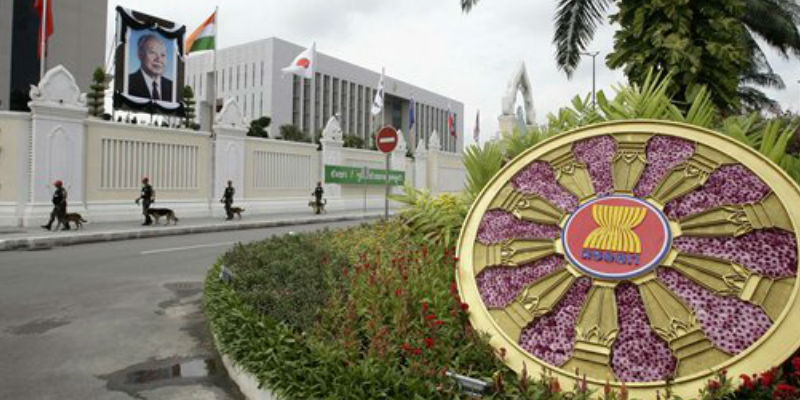
Cambodian security personnel patrol with their sniffing dogs under a portrait of Cambodia’s late King Sihanouk placed in front of the Peace Palace during the Association of Southeast Asian Nations Summit and related meetings in Phnom Penh, Cambodia, Sunday, Nov. 18, 2012. Southeast Asian leaders on Sunday endorsed a human rights declaration that they called a breakthrough for the region but critics said it fell well below global standards. AP PHOTO/HENG SINITH
PHNOM PENH, Cambodia—Southeast Asian leaders on Sunday endorsed a human rights declaration that they called a breakthrough for the region but critics said it fell well below global standards.
Leaders of the 10-member Association of Southeast Asian Nations (Asean) adopted the joint declaration at their annual summit in Phnom Penh, saying it would enshrine human right protections for the bloc’s 600 million people.
“It’s a legacy for our children,” Philippine Foreign Secretary Albert del Rosario told reporters after the signing ceremony.
The United Nations rights chief Navi Pillay and more than 60 rights groups called this month for the pact to be postponed amid concerns it undermined universal human rights standards by allowing loopholes for governments.
Asean’s members have a wide range of political systems, from authoritarian regimes in Vietnam and Laos at one end of the spectrum to the freewheeling democracy of the Philippines at the other.
Campaigners also slammed the lack of transparency and the absence of consultation with civil society groups during the drafting of the text.
Asean chief Surin Pitsuwan said the bloc’s foreign ministers made an amendment to the text on Saturday aimed at addressing those complaints.
The amended text affirmed Asean nations would “implement the declaration in accordance to the international human rights declarations and standards.”
But Phil Robertson, deputy Asia director for Human Rights Watch, said it was not enough to fix the “flawed” pact, which he said would justify crackdowns based on “national context” or on grounds of “public morality.”
“Our worst fears in this process have now come to pass,” Robertson said in a statement on Sunday.
“Rather than meeting international standards, this declaration lowers them by creating new loopholes and justifications that Asean member states can use to justify abusing the rights of their people.”
Indonesian Foreign Minister Marty Natalegawa urged observers not to jump to conclusions.
“It’s an important benchmark for Asean to be kept honest in terms of its human rights obligations,” he told reporters.
Human rights has been a sensitive issue for some Asean members, with the grouping’s policy of non-interference in members’ internal affairs often preventing the issue from being discussed more thoroughly at annual meetings.